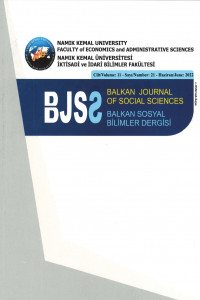Öz
This study examines the long-term relationship between inflation on fertility rate in Turkey for the periods of 1960-2019 by employing two different measures of inflation. In that sense our hypothesis asserts that higher inflation rate lowers fertility rate in Turkey. Based on the findings of KPSS stationarity test, our series are integrated order either zero or one, and thus we used ARDL boundary test approach for cointegration analyses. According to cointegration test results, fertility rate is co-integrated with consumer price index and GDP deflator, and thus they move together in the long-run in Turkey. We found a positive statistically significant long-run relationship between inflation and fertility rate. More explicitly, if consumer price index goes up by %1 then fertility rate goes down by %0.035673 and if GDP deflator increases by %1 then fertility rate drops by %0.034813 in the long-run in Turkey. Meantime, except autocorrelation problem, the both models do not suffer from heteroskedasticity and non-normality problems and are stable based on several diagnostic tests.
Anahtar Kelimeler
Inflation Fertility Unit root Co-integration Long-run Analysis
Kaynakça
- Anderson, M. D., Botman, M. D. P., & Hunt, M. B. (2014). Is Japan’s population aging deflationary?. International Monetary Fund.
- Barro, R. J. (2001). Human capital and growth. American economic review, 91(2), 12-17.
- Başkaya, Z., & Özkılıç, F. (2017). Türkiye'de Doğurganlıkta Meydana Gelen Değişimler (1980-2013). Uluslararası Sosyal Araştırmalar Dergisi, 10(54), 405-423.
- Berber, M., & Artan, S. (2004). Enflasyon ve ekonomik büyüme ilişkisi: Türkiye örneği (No. 2004/21). Discussion Paper.
- Demirtaş, G., & Yayla, N. (2017). Küresel entegrasyonun kadın istihdamı üzerine etkisi: Ampirik bir inceleme. Journal of Yaşar University, 12(48), 339-349.
- Katagiri, M. (2012). Economic Consequences of Population Aging in Japan: effects through changes in demand structure (No. 12-E-03). Institute for Monetary and Economic Studies, Bank of Japan.
- Kaygısız, A. D., & Ezanoğlu, Z. (2021). Demografik değişimin enflasyon üzerindeki etkisi. Siyasal: Journal of Political Sciences, 30(1), 45-64.
- Konishi, H., & Ueda, K. (2013). Aging and Deflation from a Fiscal perspective (No. 13-E-13). Institute for Monetary and Economic Studies, Bank of Japan.
- Orsal, D. D. K., & Goldstein, J. R. (2010, April). The increasing importance of economic conditions on fertility. In Annual Meeting of the Population Association of America, Dallas, Texas.
- Semyonov, M. (1980). The social context of women's labor force participation: A comparative analysis. American Journal of Sociology, 86(3), 534-550.
- Weller, R. H. (1977). Wife’s employment and cumulative family size in the United States, 1970 and 1960. Demography, 14(1), 43-65.
- Yoon, J. (2015). Labor market outcomes for women in East Asia. Asian Journal of Women's Studies, 21(4), 384-408.
Öz
Kaynakça
- Anderson, M. D., Botman, M. D. P., & Hunt, M. B. (2014). Is Japan’s population aging deflationary?. International Monetary Fund.
- Barro, R. J. (2001). Human capital and growth. American economic review, 91(2), 12-17.
- Başkaya, Z., & Özkılıç, F. (2017). Türkiye'de Doğurganlıkta Meydana Gelen Değişimler (1980-2013). Uluslararası Sosyal Araştırmalar Dergisi, 10(54), 405-423.
- Berber, M., & Artan, S. (2004). Enflasyon ve ekonomik büyüme ilişkisi: Türkiye örneği (No. 2004/21). Discussion Paper.
- Demirtaş, G., & Yayla, N. (2017). Küresel entegrasyonun kadın istihdamı üzerine etkisi: Ampirik bir inceleme. Journal of Yaşar University, 12(48), 339-349.
- Katagiri, M. (2012). Economic Consequences of Population Aging in Japan: effects through changes in demand structure (No. 12-E-03). Institute for Monetary and Economic Studies, Bank of Japan.
- Kaygısız, A. D., & Ezanoğlu, Z. (2021). Demografik değişimin enflasyon üzerindeki etkisi. Siyasal: Journal of Political Sciences, 30(1), 45-64.
- Konishi, H., & Ueda, K. (2013). Aging and Deflation from a Fiscal perspective (No. 13-E-13). Institute for Monetary and Economic Studies, Bank of Japan.
- Orsal, D. D. K., & Goldstein, J. R. (2010, April). The increasing importance of economic conditions on fertility. In Annual Meeting of the Population Association of America, Dallas, Texas.
- Semyonov, M. (1980). The social context of women's labor force participation: A comparative analysis. American Journal of Sociology, 86(3), 534-550.
- Weller, R. H. (1977). Wife’s employment and cumulative family size in the United States, 1970 and 1960. Demography, 14(1), 43-65.
- Yoon, J. (2015). Labor market outcomes for women in East Asia. Asian Journal of Women's Studies, 21(4), 384-408.
Ayrıntılar
| Birincil Dil | İngilizce |
|---|---|
| Konular | Ekonomi |
| Bölüm | Araştırma Makalesi |
| Yazarlar | |
| Yayımlanma Tarihi | 1 Temmuz 2022 |
| Kabul Tarihi | 23 Haziran 2022 |
| Yayımlandığı Sayı | Yıl 2022 Cilt: 11 Sayı: 21 |


